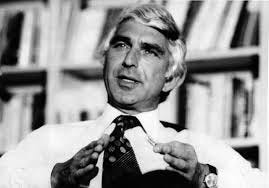In 1945, as a young lieutenant leading troops in World War II, Warren Bennis found himself making life-or-death decisions that would shape his unit's fate and his entire understanding of leadership. At 19 years old, he became one of the youngest infantry commanders in the European theatre. This crucible challenged everything he thought he knew about authority, responsibility, and the human dimension of leadership—insights that would later form the foundation of his seminal work in organisational leadership theory.
Warren Bennis (1925–2014) transformed leadership studies by being among the first to argue that leaders aren't born, but made—a radical departure from the "great man" theories that dominated the mid-20th century. As an American scholar, organisational consultant, and author, Bennis shattered the prevailing notion that leadership was an innate, almost mystical quality possessed by a select few. Instead, he championed the revolutionary idea that leadership could be studied, understood, and developed.
Bennis' influence extended far beyond academia, serving as an adviser to four U.S. presidents, including John F. Kennedy and Ronald Reagan. His bestselling books, translated into numerous languages, fundamentally reshaped leadership development by introducing groundbreaking concepts like emotional intelligence in leadership and the crucial distinction between managing and leading—ideas that were radical for their time but are now considered fundamental to organisational success.
His enduring legacy continues to shape leadership education in business schools worldwide. His frameworks are taught in virtually every major MBA program, while his methodologies for developing effective leaders have become standard practice in corporate leadership development programs. From Harvard Business School to INSEAD, his theories continue to influence how we understand and teach leadership to new generations of business leaders.
Leadership vs. Management
One of Bennis' most significant contributions to leadership theory was challenging the long-held assumption that leadership and management were synonymous. In an era when organisations prioritised management efficiency and control, Bennis made a revolutionary distinction between management and leadership. He famously said, "Managers do things right. Leaders do the right thing."
This deceptively simple statement masked a profound insight into organisational behaviour. Where managers focus on systems, control, and execution, leaders concentrate on people, direction, and possibility. Bennis argued that while managers ask "how" and "when," leaders ask "what" and "why." This distinction wasn't just academic—it fundamentally changed how organisations approached talent development and succession planning.
The implications of this distinction prove crucial for modern organisations. Managers ensure operational excellence through planning, budgeting, and problem-solving. They create the stable foundation that organisations need to function effectively. Leaders, in contrast, set direction through vision, align people through communication, and motivate through empowerment. Both roles are essential, but they serve different purposes and require different skills.
Bennis identified several fundamental differences between managers and leaders:
Focus and Direction
Managers administer; Leaders innovate
Managers maintain; Leaders develop
Managers focus on systems; Leaders focus on people
Approach and Perspective
Managers copy; Leaders originate
Managers accept the status quo; Leaders challenge it
Managers have a short-term view; Leaders have a long-range perspective
Style and Method
Managers rely on control; Leaders inspire trust
Managers ask "how" and "when"; Leaders ask "what" and "why"
Managers imitate; Leaders originate
Impact and Outcomes
Managers have their eyes on the bottom line; Leaders have their eyes on the horizon
Managers do things right; Leaders do the right thing
Managers operate within the culture; Leaders create culture
These distinctions aren't meant to diminish either role—both are essential for organisational success. Rather, they highlight the complementary nature of management and leadership, showing why organisations need both capabilities to thrive.
Consider tech giant Apple's transition from Steve Jobs to Tim Cook. Jobs exemplified Bennis's concept of leadership—he challenged conventional wisdom, inspired breakthrough innovation, and created a compelling vision of the future. Cook, while also a visionary leader, brought crucial additional strengths in management and operational excellence. Under his leadership, Apple has grown into one of the world's most valuable companies, expanding its product lineup, services, and global reach while maintaining the innovation culture Jobs established. Their complementary but different approaches demonstrate why organisations need both effective management and visionary leadership—and how these qualities can blend differently in successful leaders.
This distinction has profound implications for organisational development. Companies that understand the difference can better:
Develop talent pipelines that nurture both management and leadership capabilities
Create organisational structures that balance stability with innovation
Build cultures that value both operational excellence and transformative vision
Design training programmes that develop the right skills for each role
Adapt more effectively to market changes by deploying the right mix of leadership and management skills
Why Bennis’ Work Matters Today
"Leadership is the capacity to translate vision into reality," Bennis often reminded us. Today, as leaders navigate unprecedented challenges in an increasingly complex world, this fundamental principle proves more relevant than ever. Modern leaders must translate ambitious visions into reality amid technological disruption, societal transformation, and evolving workforce expectations.
Consider the challenge of artificial intelligence. When technology threatens to reshape entire industries overnight, Bennis' emphasis on adaptability and continuous learning becomes crucial. Leaders at companies like Microsoft and OpenAI aren't just managing AI implementation—they're grappling with profound questions about purpose, ethics, and human potential. Bennis' insistence that leaders must remain perpetual learners offers a vital compass for executives navigating these uncharted waters.
His work on authentic leadership and emotional intelligence speaks directly to the demands of today's workforce. Research from Deloitte shows that Generation Z and Millennial employees prioritise working for leaders who demonstrate authentic, purpose-driven leadership—precisely the kind Bennis championed decades ago. Companies like Patagonia and Microsoft have demonstrated how authentic leadership, coupled with clear purpose, can drive both engagement and performance.
The rise of remote and hybrid work has made Bennis' distinction between management and leadership even more critical. When teams are physically dispersed across time zones and cultures, the difference between merely managing tasks and truly leading people becomes stark. Companies like Spotify and GitLab have shown how Bennis' principles of trust-building and cultural leadership can create thriving remote organisations.
His insights on organisational adaptability provide a blueprint for modern transformation efforts. As companies face urgent imperatives around sustainability, diversity, and social responsibility, Bennis' guidance on leading through uncertainty remains remarkably prescient. Consider how companies like Unilever have transformed their business models around sustainability, or how BlackRock has repositioned itself around stakeholder capitalism—these efforts embody Bennis' vision of leadership as a force for meaningful change.
Perhaps most importantly, Bennis' vision of leadership as a moral endeavour resonates powerfully in an era of stakeholder capitalism. His insistence that leaders must serve a purpose beyond profit aligns perfectly with contemporary expectations. Today's most admired companies—from Microsoft to Patagonia—demonstrate how addressing societal challenges while delivering financial results is important.
Leadership as a Journey
"Becoming a leader is synonymous with becoming yourself. It is precisely that simple, and it is also that difficult," Bennis wrote. This deceptively simple observation captures a fundamental truth about leadership development: it's about developing your own authentic leadership voice.
He challenged the prevailing wisdom that leadership development was primarily about acquiring specific skills or competencies. Instead, he argued that true leadership emerges from a deeper journey of self-discovery and personal growth. This insight has profound implications for how organisations approach leadership development today.
Central to Bennis' philosophy was the belief that leaders develop through experience, reflection, and continuous learning. He argued that crucible moments—challenging experiences that test and shape a leader's character—play a crucial role in leadership development. These experiences, whether successes or failures, become powerful sources of learning when coupled with honest self-reflection.
Modern leadership development programmes at companies like IBM, Google, and McKinsey reflect this philosophy. Rather than focusing solely on skills training, they emphasise experiential learning, personal growth, and authentic leadership development. These organisations understand that effective leaders aren't created in classrooms alone—they develop through real-world challenges, meaningful feedback, and intentional reflection.
Bennis particularly emphasised the importance of understanding your "leadership shadow"—how your behaviour and decisions impact others. This concept remains crucial in today's interconnected business environment, where leaders' actions can have far-reaching consequences across global organisations. Understanding this impact requires both self-awareness and regular feedback from others.
The Leader as a Learner
One of Bennis' most enduring insights was that effective leadership is fundamentally linked to learning capacity. He believed that the best leaders are insatiably curious, constantly seeking new knowledge and perspectives. "In an era of rapid change," he noted, "the most successful leaders are those who stay hungry to learn."
This emphasis on learning wasn't just about acquiring new skills or knowledge. Bennis argued that leaders need to develop "learning agility"—the ability to learn from experience, adapt to new situations, and apply insights across different contexts. This capability becomes particularly crucial in today's business environment, where leaders must navigate unprecedented challenges and rapid technological change.
Bennis identified several key practices that distinguish learning leaders. They actively seek feedback, reflect on their experiences, learn from failures as well as successes, and remain open to new ideas and perspectives. Perhaps most importantly, they create environments where others feel safe to experiment, take risks, and learn from mistakes.
This focus on learning also shapes how effective leaders approach innovation and change. Rather than pretending to have all the answers, learning leaders ask powerful questions, encourage experimentation, and create conditions where new ideas can emerge and flourish.
Building Emotional Intelligence
Bennis was ahead of his time in recognising the importance of emotional intelligence (EQ) in leadership. Long before EQ became a buzzword in organisational psychology, Bennis advocated for leaders to develop self-awareness, empathy, and strong interpersonal skills. He argued that these qualities were essential for building trust, fostering collaboration, and inspiring loyalty among teams.
In practice, emotional intelligence enables leaders to:
Understand and manage their emotions during high-pressure situations.
Empathise with others, building strong, authentic relationships.
Communicate effectively, inspiring confidence and clarity in their vision.
Resolve conflicts, creating an environment where challenges are met constructively.
For example, consider a leader faced with resistance to change within their team. A leader with high EQ might recognise the emotional undercurrents driving this resistance, engage the team in meaningful dialogue, and address concerns with understanding and transparency.
Visionary Leadership: The Power of Purpose
Another hallmark of Bennis’ leadership philosophy was his focus on vision. He believed that leaders must articulate a clear and compelling vision that resonates with their followers. This vision serves as both a roadmap and a rallying cry, uniting individuals around a shared purpose.
Bennis cautioned against the kind of leadership that becomes bogged down in day-to-day management tasks, losing sight of the bigger picture. Instead, he encouraged leaders to ask, “What do we want to achieve, and why does it matter?”
In today’s world, where organisations face rapid technological advancements and shifting societal expectations, this focus on purpose is more critical than ever. Leaders who can articulate a vision grounded in values and purpose are better equipped to inspire their teams and foster a sense of belonging.
Practical Lessons for Aspiring Leaders
Warren Bennis didn’t just theorise about leadership—he provided actionable insights for those seeking to lead effectively. Some of his most enduring lessons include:
Cultivate authenticity: Leadership isn’t about imitating others but about bringing your unique strengths and perspective to the role.
Embrace vulnerability: Great leaders acknowledge their weaknesses and seek support, creating a culture of trust and collaboration.
Prioritise listening: Leadership is as much about understanding others as it is about expressing your vision.
Focus on growth: Invest in your own development and the development of those you lead.
A Lasting Legacy
Warren Bennis left us with a blueprint for leadership that transcends time and context. His teachings remind us that leadership is a profoundly human endeavour, requiring courage, humility, and an unwavering commitment to growth.
As we reflect on his contributions, let’s remember that leadership is not defined by titles or positions—it’s about making a meaningful impact. Whether you’re leading a team, managing a project, or inspiring change in your community, the question Bennis leaves us with is simple yet profound: “How will you lead?”





